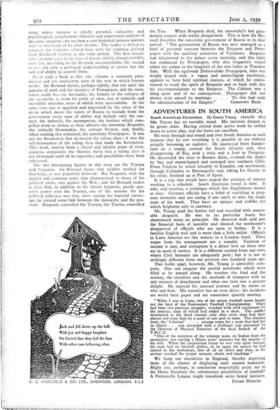ADVENTURES IN SOUTH AMERICA
South American Excursion. By Ernest Young. (Arnold. t8s.) MR. YOUNG has an enviable mind. His interests deepen as he grows older. Having retired from active work he settled
down to active play, and the fruits are excellent.
He went through and round and over South America to such purpose that he saw everthing it is possible to see without actually becoming an explorer. He journeyed from Sunder- land on a tramp, crossed the South Atlantic and, after disapproving of Rio, took a train and a boat to Paraguay.
He descended the river to Buenos Aires, stormed the Andes by 'bus and motor-launch and emerged into southern Chile.
From Valdivia he sailed leisurely to Ecuador, cut northwards through Colombia to Barranquilla and, taking La Guaira in his stride, finished up at Port of Spain.
It is a trip that would have rasped the patience of anyone working to a schedule. South American travel is slow. It asks, and receives, a technique which few Englishmen master at once. Customs officials have a habit of vanishing at preg- nant moments and not caring if one catch or miss the single train of the week. They have an opaque and codlike eye which brightens only to currency.
Mr. Young paid the furtive toll and travelled with reason- able despatch. He was in no particular hurry but abominated waste on principle. He observed with acid pen the financial basis of morality and showed the northerner's disapproval of officials who are open to bribes. It is a familiar English wail and is more than a little unfair. Officials in Latin America are like waiters in a London hotel. Their wages from the management are a scandal. Taxation of income is rare, and corruption is a direct levy on those who are in need of service. It is a different custom from our own,
where Civil Servants are adequately paid ; but it 'is not so strikingly different from our position two hundred years ago. This foible apart, however, Mr. Young is admirable com-
pany. One can imagine the careful notebooks which were filled as he passed along. He watches the food and the scenery, the travellers and the methods of transport with an odd mixture of detachment and what one feels was a present delight. He enjoyed his unusual journey and he shows us why and how. His narrative has an even drive : his incidents are worth their paper and are sometimes queerly moving.
" While I was in Lima, two of the prison football teams fought out the final of the Penitentiary Football Championship. There had been two previous struggles, watched with wild excitement by the inmates, each of which had ended in a draw. The conflict terminated at the third attempt only after extra time had been played and even then by a score of one goal to none. The winning team, the Libertad ' . . . strange name for a team that had lost its liberty . . . was rewarded with a challenge cup presented by the Director of Physical Exercises of the local branch of the Y.M.C.A.
" One of the members of the winning team, an Indian from the mountains, was serving a fifteen years' sentence for the murder of his wife. When the competition began he was very upset because his team had no football clothes, so he spent the money he had earned in the workshops, first of all on shirts and then, as his savings reached the proper amount, shorts and stockings."
We hang our murderers in FnElnrwl, thereby depriving them of the chance of displaying such earnest humanity. Might one, perhaps, in conclusion respectfully point out to the Home -Secretary the reformatory possibilities of football? A Pentonville League might transform some brutal instincts.
JUtu►it DUGUID.










































 Previous page
Previous page